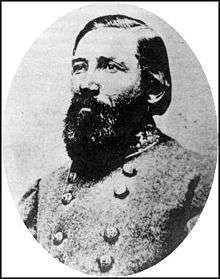Cullen A. Battle
| Cullen Andrews Battle | |
|---|---|
 Cullen A. Battle | |
| Born |
June 1, 1829 Powelton, Georgia |
| Died |
April 8, 1905 (aged 75) Greensboro, North Carolina |
| Allegiance |
|
| Service/branch |
|
| Years of service | 1861–65 |
| Rank |
|
| Unit | Army of Northern Virginia |
| Commands held | Battle's Brigade |
| Battles/wars | |
| Other work | Lawyer, newspaper editor, politician |
Cullen Andrews Battle (June 1, 1829 – April 8, 1905) was an American attorney, politician, and general in the Confederate States Army during the American Civil War.
Early life and career
Cullen Battle was a native of Powelton, Hancock County, Georgia. He later worked as a lawyer in Alabama. He was extremely active in local politics and held a position as lieutenant colonel of the local militia.
Civil War service
When the Civil War began, he was appointed as major of the 3rd Alabama Infantry on April 28, 1861, and was sent with the regiment to Norfolk, Virginia. On July 31, he was promoted to lieutenant colonel of the regiment. He fought at the Battle of Seven Pines and was promoted to colonel on May 31, 1862. He missed the Seven Days Battles, but returned to the army in time for the Maryland Campaign, in September 1862, fighting at the battles of South Mountain and Antietam. He was injured after falling from his horse just before the Chancellorsville Campaign and was forced to relinquish command. Although he re-assumed command just a day later, his injuries were aggravated when his horse jumped a ditch, forcing him to turn over command again.
Battle returned to the regiment for the Gettysburg Campaign. The 3rd Alabama was one of the regiments in Edward O'Neal's Brigade, fighting on Oak Ridge on July 1. After O'Neal's Brigade had been terribly disorganized by the first day of battle, Colonel Battle attached his regiment to Brig. Gen. Stephen D. Ramseur's brigade for the remainder of the battle. General Robert E. Lee became displeased with O'Neal's performance and relieved him of command, putting Battle in his place. Battle subsequently led the brigade in the Mine Run Campaign and the Bristoe Campaign in the autumn and early winter.
In 1864, Battle led his men in the battles of the Wilderness, Spotsylvania Court House, North Anna, and Cold Harbor. Later that year, Battle's Brigade became part of Lt. gen. Jubal A. Early's Army of the Valley and participated in the Battle of Monocacy in Maryland and the Battle of Fort Stevens on the outskirts of Washington, D.C. Back in the Shenandoah Valley, Battle fought at the Third Battle of Winchester, the Battle of Fisher's Hill, and was wounded at the Battle of Cedar Creek. His wound did not permit him to return to duty before the close of hostilities.
Postbellum career
After the war, Battle returned to the practice of law. He was denied a seat in Congress and instead became mayor of New Bern, North Carolina, where he also became the editor of New Bern Journal.[1]
Battle died in Greensboro, North Carolina, on April 8, 1905. His manuscript on the Third Alabama Infantry was not published in his lifetime; the original is now in the collection of the Alabama Department of Archives and History.[2]
See also
References
- ↑ Sifakis, Who Was Who in the Confederacy
- ↑ Website of the Alabama Department of Archives and History
External links
- "Cullen A. Battle". Find a Grave. Retrieved 2009-01-04.
|